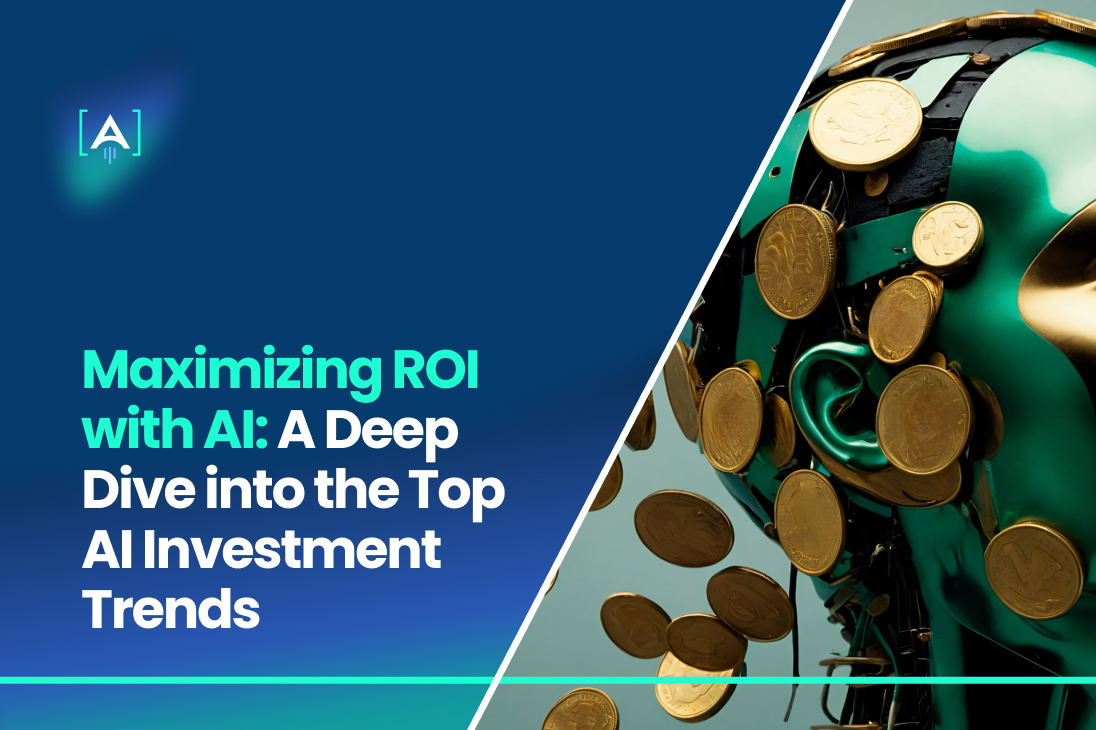Imagine a world where machines can think, learn, and even create.
This isn’t science fiction anymore. It’s the reality of artificial intelligence (AI).
As AI continues to rapidly evolve, investors seeking to capitalize on this technological revolution are also becoming interested.
“AI will be either the best or worst thing ever to happen to humanity.” Stephen Hawking
This quote captures AI’s dual potential to significantly transform the workforce, either by augmenting human capabilities and enabling new opportunities or by replacing certain jobs and creating challenges.
AI market size is expected to reach $407 billion by 2027․
Source: Artificial intelligence (AI) market size worldwide from 2020 to 2030, Statista
The data suggests a strong and accelerating demand for AI technologies across various industries.
Moreover, it reflects an increased confidence in AI’s capabilities which leads us into the world of AI-driven marketing.
The blog post will cover maximizing ROI by introducing the top 5 AI investment Trends.
Why AI is More Than a Buzzword: Your Ticket to Sustained Business Success
Artificial Intelligence has evolved beyond a futuristic concept to become a critical driver of success for businesses.
For today’s business owners and CEOs, AI investment isn’t just about staying on top of trends—it’s a strategic necessity for remaining competitive in a fast-paced market.
AI investment trends have shown that companies embracing AI are reaping substantial rewards, from optimizing operational efficiency to creating deeply personalized customer experiences.
This ability to maximize ROI through smarter, faster operations and customer-focused strategies is why AI is more than just an optional tech upgrade; AI ROI is a powerful tool for achieving sustained growth.
#1: Hyper-Personalization at Scale: AI’s Take on Customer Experience
Personalization is fast becoming a defining trend in AI investments, with business leaders now recognizing its critical role in building strong customer relationships and driving revenue.
AI has unlocked the ability to deliver ultra-personalized customer experiences by analyzing vast amounts of data to understand individual preferences, behaviors, and needs on a granular level.
Personalization 2.0: How AI Delivers Unparalleled Customer Insights
The days of one-size-fits-all marketing are over. With AI, businesses can now leverage data-driven insights to offer unique, tailored experiences.
Source: McKinsey Research
Modern AI models can parse through customer data to detect patterns and predict future preferences, enabling companies to offer precisely what customers want before they even ask for it.
This kind of ultra-personalization isn’t just about recommending products; it’s about creating a seamless customer journey that feels bespoke at every touchpoint.
For example, AI tools can analyze browsing history, past purchases, and even real-time behavior to deliver personalized product recommendations, email content, and advertising.
This targeted approach increases engagement and conversion rates, demonstrating why AI investments in personalization yield high ROI.
For CEOs, this means that AI isn’t just a marketing tool—it’s a strategic asset that aligns closely with business goals and customer-centric strategies.
How AI Personalization Translates to Tangible ROI
For business leaders, one of the most compelling reasons to invest in AI-driven personalization is the clear ROI it delivers.
Personalization strategies powered by AI not only boost customer satisfaction but also lead to higher conversion rates, greater lifetime value, and reduced churn.
As AI investment trends continue to show, businesses that prioritize personalization are seeing substantial returns on their AI investments.
- Increased Sales and Conversions: Tailored recommendations and targeted content, with the help of AI content marketing tools, make customers more likely to buy, leading to direct revenue growth.
- Enhanced Customer Loyalty: When customers feel understood, they are more likely to remain loyal to a brand, resulting in repeat purchases and long-term value.
- Reduced Marketing Costs: By targeting customers more effectively, businesses can optimize their marketing spend and achieve better results with less waste.
#2: AI-Powered Decision-Making: Your New Strategic Advisor
For CEOs and business owners, investment trends in AI show that investing in AI solutions is no longer just about streamlining operations or automating routine tasks. It’s about leveraging AI as a strategic advisor that can analyze vast datasets, forecast trends, and provide actionable insights.
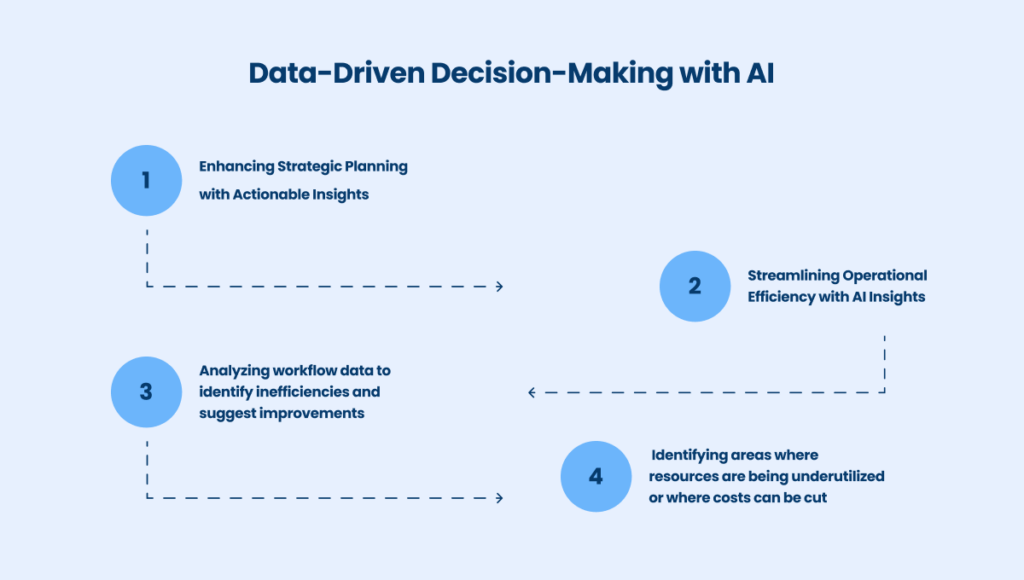
The latest investment trends in AI reflect this shift. AI systems are now essential to driving smart, data-informed decisions that lead to measurable outcomes and competitive advantage.
Where traditional analytics might struggle with vast amounts of unstructured data, AI marketing analytics and other advanced tools can interpret complex data to identify patterns, predict future scenarios, and offer actionable insights.
Source: Radix web
This elevates AI from a back-office support role to a front-line advisor that business leaders can rely on for strategy and planning.
- Beyond Crunching Numbers: AI isn’t just about number crunching anymore. Advanced AI models utilize machine learning to interpret and even learn from data patterns, refining insights and forecasts with each iteration.
This means that CEOs can make strategic decisions based on a more nuanced understanding of their business, market conditions, and customer behaviors. - Investment trends in AI highlight the importance of Real-Time Data Analysis: In today’s fast-paced business environment, waiting days or weeks for analytics is no longer an option. AI tools can analyze data in real-time, allowing decision-makers to respond to changes and opportunities as they happen. This agility is invaluable for CEOs aiming to stay ahead in competitive markets.
#3: AI in Cybersecurity: The Ultimate Digital Bodyguard
Cybersecurity is a top priority for business leaders. With increasing cyber threats, AI has emerged as a powerful ally, acting as the ultimate digital bodyguard.
Unlike traditional methods, AI can detect and respond to security breaches in real-time, minimizing risks and protecting valuable data.
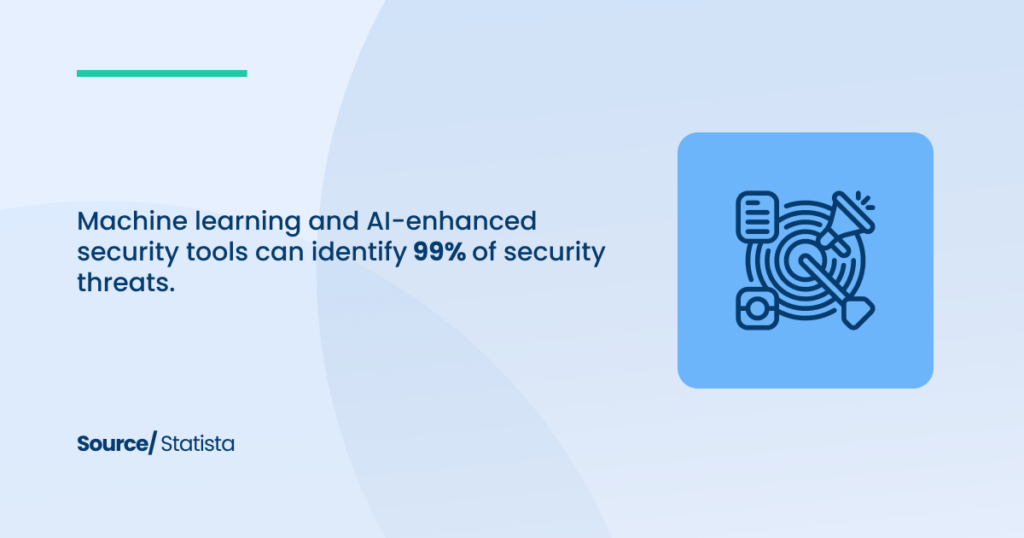
Why AI is the Key to Advanced Cybersecurity
Traditional cybersecurity measures, like firewalls and antivirus software, react only when a threat is identified. AI, however, brings a proactive approach.
Through constant monitoring and predictive analysis, AI systems can identify threats before they cause harm.
This ability to act quickly is crucial, as it means AI can block attacks, mitigate damage, and secure data faster than human teams can. By leveraging AI investment trends, companies can gain a competitive edge in cybersecurity.
- Real-Time Threat Detection: AI tools for cybersecurity can analyze vast amounts of data instantly, identifying unusual patterns that may indicate a threat. This rapid analysis allows for immediate response, reducing the window of vulnerability. AI can flag potential risks, preventing breaches that could lead to data theft or financial loss.
- Predictive Analytics: With predictive capabilities, AI systems don’t just wait for an attack. They analyze historical data, learn from past incidents, and anticipate future threats. This forward-looking approach means businesses can fortify their defenses and adapt to emerging threats faster than competitors.
How AI Secures Your Data Round-the-Clock
AI operates 24/7, tirelessly monitoring networks, analyzing behaviors, and scanning for threats. This constant vigilance is essential for businesses that handle sensitive data or have global operations.
AI’s automated response allows cybersecurity teams to focus on more complex tasks, knowing that routine monitoring is under control. This level of security is invaluable for business leaders looking to build trust with their customers and stakeholders.
Automated Responses to Contain Threats Immediately
Once a threat is detected, AI can initiate automated responses to contain and neutralize it.
Unlike manual methods that require human intervention, AI’s quick response time can prevent the spread of malware or unauthorized access. This capability is especially useful for CEOs who manage businesses with large-scale digital operations, where delays could lead to substantial losses.
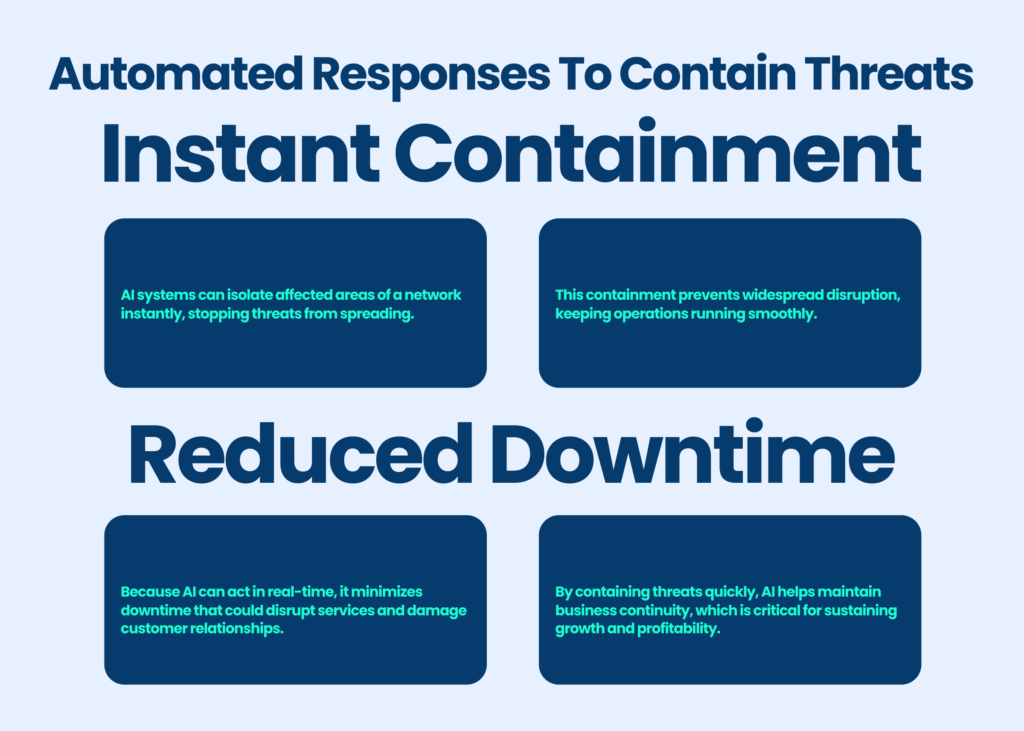
AI’s Role in Identifying Complex Attack Patterns
Cybercriminals are constantly evolving, using sophisticated techniques to bypass standard security measures. AI tools are uniquely suited to adapt to these changing tactics.
By using machine learning, AI systems can recognize complex attack patterns that traditional methods might miss. For CEOs, this means a more resilient defense that grows stronger over time.
- Machine Learning for Evolving Threats: AI learns from each attack, refining its ability to detect new methods and techniques. This adaptability ensures that cybersecurity defenses remain robust, even as threats become more advanced.
- Behavioral Analysis: AI analyzes user behavior to identify anomalies, such as unusual login locations or unexpected access attempts. This insight allows businesses to detect insider threats or account compromises before they escalate.
#4: Green AI: The Next Frontier in Sustainable Business Innovation
Companies are increasingly turning their attention to a new priority: Sustainability.
Enter Green AI—a growing trend where businesses prioritize energy-efficient AI models and sustainable practices to minimize their carbon footprints.
Source: Green-in vs. green-by Algorithms in AI, Science Direct
Green AI isn’t just a moral imperative; it’s a strategic move that aligns with corporate social responsibility (CSR) goals and enhances brand value.
As AI technologies evolve, they offer opportunities not only for innovation but also for building a greener, more sustainable future.
Why Green AI is the Future of Sustainable Business
AI systems are known for processing power, but this comes at an environmental cost. Training large AI models, particularly in generative AI, consumes vast amounts of energy, contributing to significant carbon emissions.
Recognizing this, AI leaders are now focusing on minimizing these environmental impacts through energy-efficient AI initiatives. Green AI represents a shift from developing AI solely for performance to creating AI solutions that are both effective and eco-friendly.
- Corporate Responsibility Meets Innovation: As more companies adopt AI technologies, there’s a growing emphasis on aligning these advancements with CSR goals. By incorporating Green AI practices, businesses can drive innovation while reducing their environmental impact.
- Consumer Demand for Sustainable Practices: Today’s consumers are more aware of environmental issues and often prefer brands that are committed to sustainability. Green AI allows companies to meet this demand, positioning themselves as responsible and forward-thinking.
Green AI as a Competitive Advantage
For CEOs, investing in Green AI offers a unique competitive advantage. While many companies focus solely on AI’s performance benefits, Green AI allows businesses to position themselves as leaders in both innovation and sustainability.
By integrating energy-efficient AI into their operations, companies can meet evolving consumer expectations, reduce costs, and drive long-term growth.
#5: AutoML for the Non-Techie: Making AI Accessible Across the Board
The rise of Automated Machine Learning (AutoML) is changing that narrative. AutoML tools allow non-specialists to build, train, and deploy AI models, making powerful analytics accessible to anyone within an organization.
AutoML represents a game-changing opportunity for CEOs: it democratizes AI, enabling departments across the company to leverage AI for problem-solving and innovation without needing a dedicated data science team.
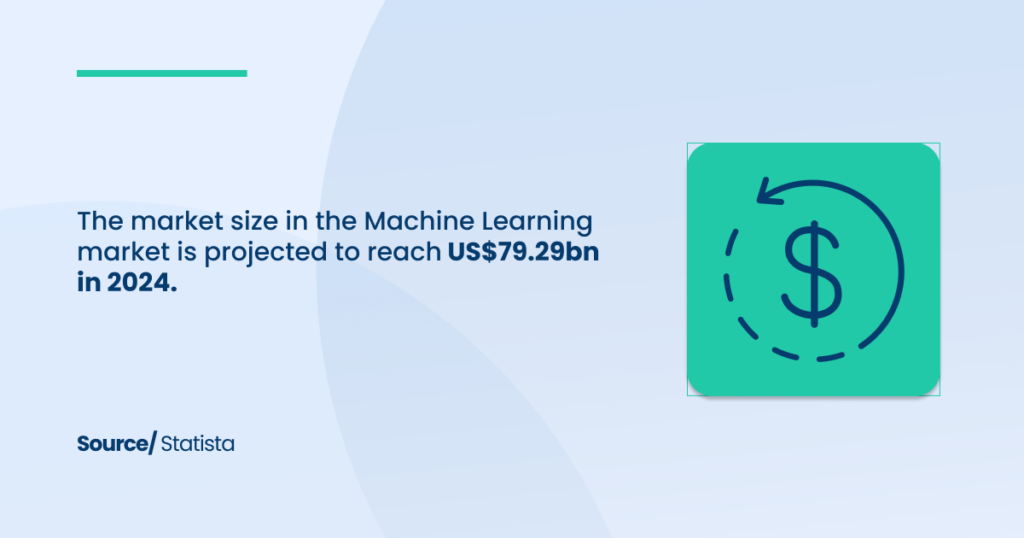
As AI investment trends continue to evolve, the adoption of AutoML is rapidly becoming a strategic choice for businesses that want to integrate AI into their operations seamlessly.
What is AutoML, and Why Should CEOs Care?
AutoML simplifies building AI models by automating key steps, such as data pre-processing, feature selection, model selection, and hyperparameter tuning.
Traditionally, these tasks required expertise in machine learning, but AutoML eliminates that barrier, allowing employees with minimal technical background to harness the power of AI.
This makes it an attractive option for CEOs looking to integrate AI technology into various business functions, from marketing to operations.
- Streamlining AI Adoption: By reducing the technical complexity of AI, AutoML accelerates AI adoption across the organization. This means that companies can move faster on AI initiatives and begin to see ROI more quickly.
- Broader Access to AI Tools: With AutoML, AI isn’t confined to the data science team. It can be used by marketing, HR, finance, and other departments, turning AI into a ubiquitous tool for driving insights and enhancing decision-making.
The Democratization of AI: AutoML as an Equalizer
One of the most exciting aspects of AutoML is its potential to democratize access to AI.
In many organizations, AI has been concentrated in specialized teams, creating a bottleneck where only a few can tap into its full capabilities.
AutoML changes this by enabling people across the organization to experiment with AI models, allowing them to address their own unique challenges with data-driven solutions.
1. AI for All Departments: Extending AI Beyond the IT Team
With AutoML, AI moves beyond the IT team and becomes a tool for innovation across departments.
Marketing teams can use AutoML to refine targeting strategies with predictive analytics. Finance teams can leverage it for fraud detection, and HR departments can use it to streamline recruitment through data-driven candidate assessments.
- AI in Marketing: AutoML tools can help marketing teams build models that analyze customer data, segment audiences, and predict campaign success. By automating these processes, AutoML allows marketing departments to execute data-driven strategies without depending on IT support.
- AI for Social Media Insights: With AutoML, social media teams can analyze vast amounts of engagement data, spot trends, and make adjustments in real-time. AutoML also integrates well with AI tools for social media marketing, enabling teams to optimize an AI content strategy based on predictive analytics.
2. Simplifying Data-Driven Decision Making for CEOs
For CEOs, the appeal of AutoML lies in its ability to deliver actionable insights quickly and efficiently.
By providing business leaders with access to automated analytics, AutoML enables faster decision-making based on robust data insights. This enhances a CEO’s ability to steer the company toward growth and navigate the complexities of the modern business landscape.
- Empowering the C-Suite with Analytics: AutoML tools allow CEOs and other executives to engage with AI technology directly. By enabling leaders to analyze data without relying on data scientists, AutoML streamlines strategic planning and improves the quality of decision-making.
- Broadening AI’s Reach for Growth Marketing: In growth marketing, where speed and flexibility are critical, AutoML helps leaders develop strategies based on predictive analytics. This trend in AI investment makes it easier for companies to respond to market changes and maximize growth opportunities quickly.
Maximizing AI ROI: Why CEOs Must Watch These Game-Changing Trends
For CEOs focused on maximizing the return on their AI investments, keeping a close eye on emerging AI trends is essential.
The five trends we’ve explored offer distinct pathways to drive value, streamline operations, and unlock new growth opportunities.
These AI investment trends aren’t just about adopting cutting-edge technology; they are about leveraging AI to make informed decisions, enhance customer satisfaction, and operate sustainably.
By integrating AI marketing strategies, business leaders can ensure that their AI initiatives generate measurable, impactful ROI.
Invest in AI Trends Today to Lead Tomorrow
The possibilities are boundless as we stand on the precipice of an AI-dominated era.
From revolutionizing healthcare to reshaping transportation, AI aims to redefine the way we live and work. The journey ahead will be marked by both challenges and triumphs, but one thing is certain: the Future is AI.
[A] Growth Agency will lead you on this exciting path. Growth isn’t just what we offer_it’s who we are. Our experienced team believes in the power of data to inform and drive every strategy, ensuring our actions are as effective as they are innovative.
Moreover, we treat every business as a unique entity. Our strategies are tailor-made, and we’re not afraid to experiment to find the best path forward.
Together, we can shape the future of AI.
